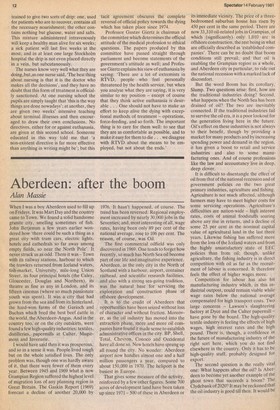Aberdeen: after the boom
Alan Massie
When I was a boy Aberdeen used to till up on Fridays. It was Mart Day and the country came to Town. We found a solid handsome granite city, smelling sometimes of fish. John Betjeman a few years earlier wondered how 'there could be such a thing as a great city with tram cars, electric lights, hotels and cathedrals solar away among empty fields, so near the North Pole'. It never struck us as odd. There it was —Town with its railway stations, harbour to which the trawlers returned from Iceland waters, fish-market, University, mile-long Union Street, its four principal hotels (the Caley, Gloucester, Douglas and Northern), its theatre as fine as any in London, and its fifteen cinemas (where so much passionate youth was spent). It was a city that had grown from the sea and from its hinterland, the hard-won farms of the Garioch and Buchan which bred the best beef cattle in the world, the Aberdeen-Angus. And in the country too, or on the city outskirts, were found a few high-quality industries: textiles, distilleries, papermills at Culter, Mugiemoss and Inverurie.
I would have said then it was prosperous, and so in a sense it was. People lived tough but on the whole satisfied lives. The only problem was, though one was hardly aware of it, that there were fewer of them every year. Between 1945 and 1969 what is now Grampian Region suffered the highest level of migration loss of any planning region in Great Britain. The Gaskin Report (1969) forecast a decline of another 20,000 by 1976. It hasn't happened, of course. The trend has been reversed. Regional employment increased by nearly 30,000 jobs in the Seventies; and, most interesting of all, wage rates, having been only 89 per cent of the national average, rose to 106 per cent. The reason, of course, was Oil.
The first commercial oilfield was only discovered in 1969. One tends to forget how recently, so much has North Sea oil become part of our life and imaginative experience. Aberdeen, as the only city in the North of Scotland with a harbour, airport, container railhead, and scientific research facilities, and also with a strong sea-going tradition, was the natural base for servicing the exploration and construction phase of offshore development.
It is to the credit of Aberdeen that opportunities have been seized without loss of character and without friction. Moreover, as the oil industry has moved into the extraction phase, more and more oil companies have found it made sense to establish administrative offices in the city. BP, Shell, Total, Chevron, Conoco and Occidental have all done so. New hotels have sprung up all round the city. No wonder: Aberdeen airport now handles almost one and a half million passengers a year, compared to about 150,000 in 1970. The heliport is the busiest hi Europe.
That gives some measure of the activity, reinforced by a few other figures. Some 700 acres of development land have been taken up since 1971 — 5()0 of these in Aberdeen or its immediate vicinity. The price of a threebedroomed suburban house has risen by 450 per cent in the same period. There are now 33,310 oil-related jobs in Grampian, of which (significantly) only 1,010 are in offshore construction, the rest being in what are officially described as 'established companies'. There can be no doubt that boom conditions still prevail, and that oil is enabling the Grampian region as a whole, and Aberdeen city in particular, to ride out the national recession with a marked lack of discomfort.
But the word Boom has its corollary, Slump. Two questions arise: first, how are the traditional industries doing? Second, What happens when the North Sea has been drained of oil? The two arc inevitably connected. If the traditional industries fail to survive the oil era, it is a poor lookout for the generation living here in the future. Oil's effect on these industries is not always to their benefit, though by providing a market for many products and by increasing spending power and demand in the region. it has given a boost to retail and service industries and also to some manufacturing ones. And of course professions like the law and accountancy live in deep, deep clover.
It is difficult to disentangle the effect of oil from that of the national recession and of government policies on the two great primary industries, agriculture and fishing, Agriculture is not much affected, although farmers may have to meet higher costs for some servicing operations. Agriculture's difficulties are nation-wide — high interest rates, costs of animal foodstuffs soaring above any rise in returns, and a decline of some 25 per cent in the nominal capital value of agricultural land in the last three years. Likewise fishing has suffered more from the loss of the Iceland waters and from the highly unsatisfactory state of EEC policies than from oil; though, unlike agriculture, the fishing industry is in direct competition with oil as far as the recruitment of labour is concerned. It therefore feels the effect of higher wages more. , Competition for labour has also hit manufacturing industry which, in this industrial outpost, could remain viable while wage rates below the national average compensated for high transport costs. Two large concerns — Lawson's slaughtering factory at Dyce and the Culter papermill — have gone by the board. The high-quality textile industry is feeling the effects of high wages, high interest rates and the high pound. There is, though, a confidence in the future of manufacturing industry of the right sort here, which you do not find elsewhere in the country. Only it has to be high-quality stuff, probably designed for export. The second question is the really vital one: What happens after the oil? Is Aberdeen to become yet another example of the ghost town that succeeds a boom? The Clydebank of 2020? It may be reckoned that the oil industry is good till then. It would be foolhardy to expect North Sea extraction to continue, except on a reduced scale, beyond that date.
One man who believes that far too little thought has been given to the question is Ian Wood, Managing Director of the John Wood Group of Companies, Ian Wood straddles the great divide, for the original Wood Group family company, Wood and Davidson, goes back to 1912 and was a fishing company, owning trawlers and shipbuilding and repairing yards. They still retain their fishing interests, but have seized the opportunities offered by oil. They now Provide the oil industry with specialist services like fire protection, corrosion control, and electronic safety, systems. The intention, says Mr Wood, is that 'our North Sea oil engineering technology should result in the establishment of oil equipment Manufacturing activities in the area, and internationally based servicing industries.' in other words, Aberdeen and the northeast of Scotland must not simply be content to take the immediate and obvious benefits Of the boom, but must capitalise on them: stop being the terminus and become a point Of departure. At the moment this is far from being achieved. Though the Department of Energy claims that 79 per cent of 'orders Placed in the UK for goods and services for developments offshore in 1979' went to British companies, even the briefest examination of their criteria for determining What constitutes a British company dulls the picture: 'companies which through employment, manufacturing or subcontracting make a substantial contribution to the UK economy'. That definition includes numerous companies, which, though they have located themselves in Grampian for the time being, will certainly uproot and move on when the oil runs out. Although large American companies like Baker and Vetco have set up manufacturing plants in Aberdeen, these offer no basis for longterm prosperity. Scotland surely has too much experience of the meaning of a branch-line economy to rely on that.
Accordingly, if Aberdeen is to avoid the West of Scotland malaise half a century hence, two things are necessary. First, there must be a commitment of management and research to the constantly changing oil technology so that Aberdeen can provide international manufacturing and service facilities for the oil industry operating elsewhere. That is, the oil industry has to become indigenous — 'One of next century's traditional industries,' to quote Ian Wood again. The model must be Houston, Aberdeen's twin city; it grew from oil and oil wealth — when did it last see a barrel of the stuff?
Secondly, the present traditional industries, none of which is necessarily obsolescent like the heavy industries of old Clydeside, have to be nursed and fostered. That means that they may have to be helped to live with the difficulties oil has brought them. Instead, what has happened? The North-East has lost development status. It may seem odd to suggest that one of the few currently prosperous areas of the UK requires this, but it is in fact the very nature of this oil-based prosperity that makes it essential for the non-oil sector.
We could see in Grampian the national waste of the enormous advantage North Sea oil gives to Great Britain being repeated on a local scale. That would mean taking all the immediate benefits and blowing them. This bankrupt's progress would mean letting the foreigner make the investment, the foreigner supply the expertise until he moves on, uprooting and liquidating, when the North Sea is exhausted. Then, indeed, those who have happily lived off the oil industry, but have made no contribution in lasting terms, will feel the pinch. And there will be little left for them to fall back on.
Fortunately it is not too late. Oil has only been here 12 years, It is good for another 30 or 40. The technology develops with unbelievable speed. The chance of thorough involvement which will lead to a lasting prosperity is still there. But it demands concentration of effort.
North Sea oil is, for Great Britain on a national scale, and Grampian on a local one, a bonus. In itself it cures none of our deep-rooted problems. Handled badly, it will make them worse; it looks as if this may be happening. The Midas touch was a curse, not the blessing it first seemed. Well, the oil industry is our national King Midas perhaps: how do you live with him? How do you use him?







































 Previous page
Previous page